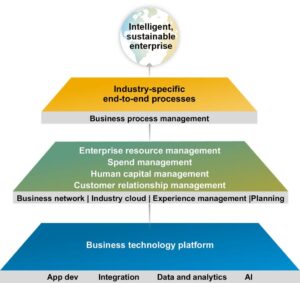Chemical companies are on a nonstop roller coaster of market shocks and digital transformation. Sandwiched between feedstock and energy companies and downstream processing industries, they’re predestined to play a vital role in fulfilling business-to-business (B2B) and consumer expectations for sustainable, reliable, innovative, and trusted products and services.
But rising to the challenge of today’s marketplace – especially increasing raw material and energy prices, margin pressure, supply chain complexity, and regulatory requirements – requires much more than Industry 4.0 initiatives focused on efficiency and price reduction. From operational performance to customer experience, companies must integrate data from across the enterprise into a single source to form sound decisions that make sustainability profitable and profitability sustainable.
Such a transformation is undoubtedly technology intensive, but the key enablers are also unassailably human. Understanding this reality, many chemical companies rely on the SAP Advisory Services portfolio, provided by the Business Transformation Services group at SAP, to help transform their operations and gain a competitive edge amid fast global changes.
Turning Challenges into Great Opportunities
Competitively addressing turbulence depends on the ability to view transformation through the lens of six fundamental challenges:
R&D Pressure across the Product Portfolio
The imperative to resist margin shrinkage, mitigate risks, increase ROI, and boost growth calls for innovative products and services that offer business value and foster close partnerships with customers. By pushing forward the adoption of advanced technologies to drive global R&D, supplier, and customer collaborations and joint ventures, businesses can prevent commoditization.
The Need for Vertical Integration
Evolving production facilities with a balance of high efficiency, global scale, flexibility, and intelligent responsiveness allows supply chains to weigh the synergistic benefits of integrated manufacturing plants or industrial parks against the flexibility of smaller plants. As a result, businesses can leverage new opportunities with disruptive business models, such as making raw materials instead of buying them and producing semi-finished or even finished goods.
Global Supply Chain Complexity
Global supply chains must be secure enough to mitigate volatile market conditions, such as global health emergencies, rising prices for raw materials and energy, and other factors that impact economic conditions. Companies can gain this advantage by establishing commercial and logistical transparency to support optimization and global planning of demand, sales, and operations.
Hidden Advantages of Business Networks
Business cannot stay competitive in a complex ecosystem alone. They must also scale and optimize their supply chain globally with business networks, such as the Catena-X Automotive Network. Doing so empowers suppliers, contract and toll manufacturers, joint ventures, and customers to collaborate openly and create new prospects for co-innovating better products and services, improving value chain efficiency, and fueling long-term growth.
Compliance and Sustainability Urgency
A primary objective for any chemical business is ensuring compliance with industry regulations. Yet, B2B customers also favor suppliers that help meet their own environmental, social, and governance (ESG) mandates. Sustainable businesses and innovations provide balance between these two expectations, creating a highly sought-after competitive edge by gearing products and services towards a circular economy.
Business Agility
The industry’s dynamic and fast-changing environment of mergers, acquisitions, and divestitures is creating tremendous complexity and pressure for permanent change and adaptation. Chemical companies need to balance industry-wide globalization and centralization while increasing business agility.
Chemical companies with a digital strategy encompassing all these topics can address industry challenges and seize on market trends in a disruptive manner. Through digital innovation, businesses can gain new opportunities and capabilities never previously considered possible – including increased speed and efficiency, process automation, and data transparency.
Seizing the Moment with Advisory Expertise
From the perspective of SAP Advisory Services, digitalization is not just another IT term but also a critical business priority. The more intelligent and sustainable a company becomes, the more agile, flexible, and integrated its value chain becomes.
Advisory experts from SAP can enable chemical companies to turn their fundamental challenges into opportunities with a well-structured, business-driven design. This approach elaborates on the steps of the digital transformation journey – leading to a road map for future architecture design. Each phase of the road map follows an ideal sequence of digital innovation, technology adoption, and industry best practices and leverages the highest value for the company in the short term.
SAP Advisory Services help organizations evaluate and act on the sentiments of their customers, partners, and employees and improve their environmental impact. Chemical companies can then be well positioned to keep their workforce engaged, increase organizational agility, and deliver the products and services customers need and trust. Furthermore, they can control their varied sources and categories of spending with outstanding finance and operational efficiency and real-time enterprise insight.

Essentially, chemical companies that work with SAP advisory experts can realize their potential as intelligent enterprises. They can make confident decisions and drive continuous innovation to adapt, innovate, and overcome challenges while making responsible choices that help reduce waste and emissions and drive long-term growth.
This business model is accomplished with intelligent technologies, including business networks, a business technology platform, cloud-based infrastructures, and solutions for business process management, experience management, industry cloud, and sustainability management. Additionally, artificial intelligence (AI), blockchain, data platforms, the Internet of Things (IoT), machine learning, predictive analytics, and virtual as well as augmented realities (VR/AR) are embedded in the intelligent technologies to drive end-to-end business processes and decision-making across enterprise domains.
Bringing to Life an Intelligent and Sustainable Network
The pressures on the chemicals industry may be relentless, with shocks coming in from all directions. However, this doesn’t mean businesses cannot find great opportunities in this volatile environment. With the right approach to digitalization, they can transform, innovate, and collaborate across the value chain to build upward momentum and better serve customers as an intelligent and sustainable network.
Learn more about the market trends and business priorities shaping various lines of businesses in the chemical industry and how SAP can help guide the innovation needed to overcome them. Read the series “Business and Digital Trends in the Chemical Industry” on SAP Community.
Ornulf Rexin is chief business consultant of Chemicals and Life Sciences for Business Transformation Services at SAP.



